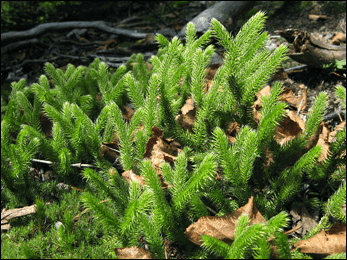
What is Club Moss?
Club Moss is the most widespread species of the Club Moss group. It is also the most studied species. These plants are evergreen herbs with needle-like leaves.
What is the Botanical Name of Club Moss?
Lycopodium clavatum
What are the other Names used for Club Moss?
They are also known as creeping cider, ground pines, wolf’s foot clubmoss, wolf-paw clubmoss, foxtail clubmoss, running pine, running moss, and princess pine.
How can be Club Moss Scientifically Classified?
- Kingdom – Plantae
- Division – Lycopodiophyta
- Class – Lycopodiopsida
- Order – Lycopodiales
- Family – Lycopodiaceae
- Genus – Lycopodium
- Species – L. clavatum
General Description of Club Moss
It is a vascular spore-bearing evergreen plant which grows up to 1m long. Stems are branched and closed densely with spirally arranged small leaves. Leaves are 3-5 mm in length and up to 1mm wide and are modified sporophylls which enclose spore capsule. Leaves are yellowish green in color and are also called mesophylls. Its stems produce roots at frequent intervals. Its roots are thin adventitious and dichotomously branched. Spores are homosporous, light yellow colored, unicellular, filled with oil and fats. Spores germinate in about 3-8 years.
Where is Club Moss Distributed?
It is spread across several continents. It is found commonly in Europe, Asia, and North America. This plant is usually found in the temperate regions like moist shaded woodlands, rocky sleep and mixed woods. But due to regular burning in farmed areas and sites, this species is endangered in many of the places.
What are the Chemical Constituents of Club Moss?
The chemical constituents of this plant include alkaloids (1-0.2%) which include eine, Flavonoids, Polyphenols and Triterpenoids.
Which parts of the Club Moss used for the Medicinal Purpose?
Whole plant
What are the Medicinal uses of Club Moss?
- Club moss effectively treats various diseases of the kidney and urinary passage.
- It has anti-inflammatory properties which help to treat inflammatory conditions like rheumatism and varices.
- This herb shows antifungal, antimicrobial and antiviral properties, i.e. it kills fungi, bacteria, and viruses and prevents the body from certain types of infection.
- Club moss has hepatoprotective properties. It treats and prevents various ailments of the liver.
- This plant contains various alkaloids which help to prevent and treat cancer.
- Spores of this plant produce a powder which can be used as a chemical marker. This chemical marker can be used for various forensic studies.
- Club moss prevents various protozoan infections.
- It eliminates toxins and free radicals from the body and provides strength to the body to fight against various ailments.
- Pain can be relieved using this herb.
- External application of this herb treats itching of skin and various other skin conditions.
- It helps to relieve pain and swelling of joints associated with rheumatism.
- This herb expels gas from the intestines and also reduces flatulence.
- Phlegm and mucus can be removed from the respiratory system by the use of this plant.
- Club moss acts on kidney increasing the flow of urine.
- It controls internal bleeding.
- This herb improves overall health and acts as a stimulant.
- In the Homeopathic system of medicine Club Moss is used under the name of medicine Lycopodium Clavatum. It is the best homeopathic remedy for liver diseases and for people who have a sensitive digestive system. This remedy is also used to treat indigestion, hemorrhoids, enlarged prostate, nervousness and headaches of the right side.
What can be the Side-Effects of Club Moss?
- Overuse of Club Moss can cause diarrhea and may prove fatal.
- It can cause motor nerve paralysis and cause internal toxicity.
- It can cause bradycardia, i.e. slow heart rate. So the people who are already having a slow heart rate should avoid taking it.
- People having intestinal blockages should avoid taking it as Club Moss can cause congestion in the intestines.
- This herb can increase intestinal and stomach secretions which could worsen the ulcers.
- Fluid secretions in the lungs can be increased by taking Club Moss that could worsen the condition of the patient having lung ailments like emphysema or asthma.
- It could increase the risk factor of seizures.
- This plant could increase urinary tract secretions and hence can worsen the urinary tract obstruction.
